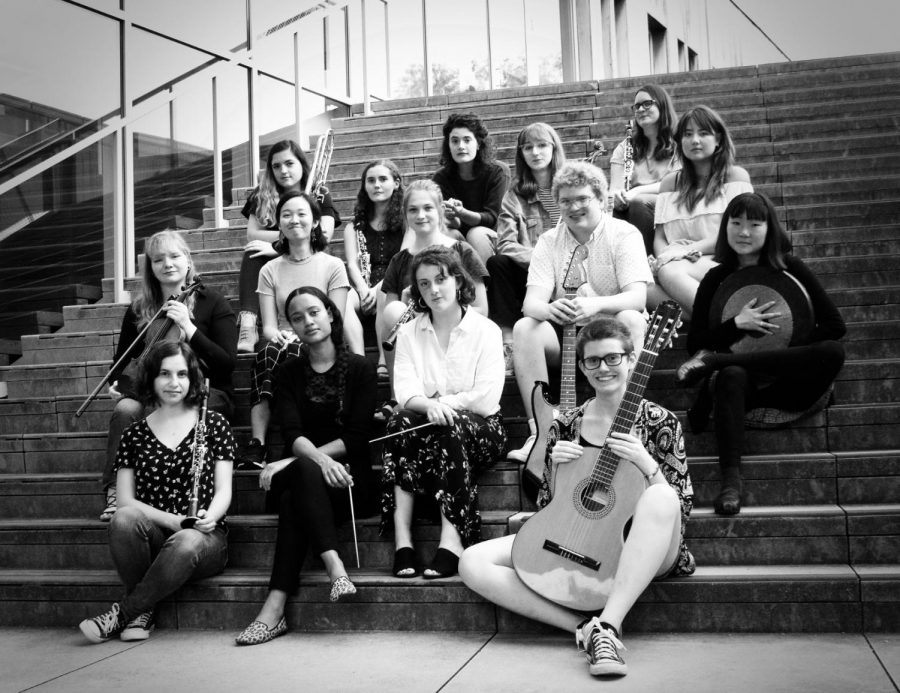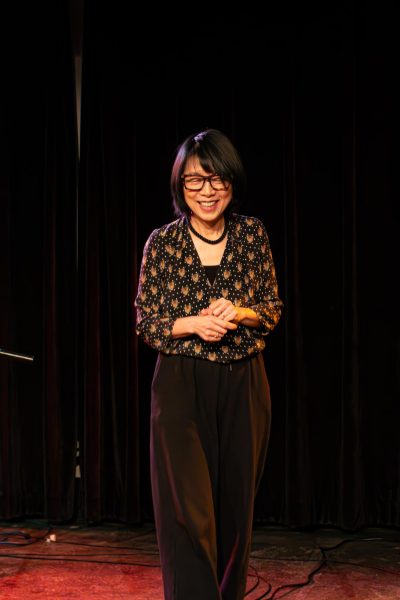Oberlin Students for Gender Inclusivity in Music Presents Phlox
Photo Courtesy of Students for Gender Inclusivity in Music.
Students in the Phlox Ensemble sit with their instruments.
Can you think of a famous female, transgender, or nonbinary classical music composer? The average person would likely know the name Beethoven or Bach, but might struggle to recall a composer who’s not a cisgender man.
The Phlox Ensembles, an intensive two-week Winter Term orchestra and choir, aim to combat this lack of gender inclusivity by performing works by composers that are not cisgender men. Organized by Oberlin Students for Gender Inclusivity in Music, the ensembles are a space to promote and celebrate composers and performers of underrepresented gender identities.
College third-year and Musical Studies major Olivia Fink founded and conducted the choir along with selecting the repertoire that the Phlox Choir ensembles performed. Additionally, the ensembles are open to musicians who are not part of the Conservatory: about half of all the performers are College students.
“Hearing a piece performed allows a composer to edit and improve it,” said Lucca Abele, College second-year and Phlox musician. “Female composers don’t have that opportunity as often, and so they don’t have as much of a chance to tweak things and change the dynamics of their piece.”
Nan Washburn, who has completed over 20 seasons as music director of the Michigan Philharmonic and has won numerous awards for her orchestral conducting and performance, conducted the orchestra alongside the student conductor, College fourth-year and Musical Studies major Sophia Bass.
However, Washburn’s road to success has not been without obstacles. When asked if she had been treated differently or less seriously than her male counterparts in composition and performance, Wash- burn replied, “Absolutely.”
“I have had many years of disappointments, especially in auditioning for conducting positions,” Washburn continued. “I was told I was the winning candidate at the audition for an associate conductor position, only then to be told that the ‘maestro’ music director had decided to hold another round of auditions at a later time. I did know that when I met with the ‘maestro’ during the audition, he was clearly uncomfortable with me being in the finals.”
Amidst institutional prejudice in the field, Washburn notes how Phlox provides a unique platform for underrepresented composers who deserve to be heard.
“A concert featuring music by women, trans, and nonbinary individuals reminds us all just how often great and musically-significant compositions are not performed simply because the composer happens to have a female first name or otherwise does not fit the traditional, white male composer model,” Washburn said. “Musicians and audiences lose out when we deny part of our musical history and [the] opportunity to hear all this beautiful music.”
The ensembles perform both modern and historical compositions by women, trans, and nonbinary composers, including some pieces composed by Oberlin students. In addition to attending rehearsals, ensemble performers were encouraged to participate in activities such as listening parties for other music by composers of underrepresented gender identities and public talks relating to gender in music.
Blinkoff noted that, despite being a musician since childhood, Phlox was the first time she had been significantly exposed to non-male composers. The pervasiveness of white male composers in academic study is evident, including at the Oberlin Conservatory.
Above all, non-male composers and composers of color have always existed and will continue to produce great work. Phlox is just the beginning for programs that could promote gender inclusivity both within and outside the ensembles.
“I think if we start bringing in more of the names of non-male composers to music education and playing their pieces and talking about them, there will be more recognition of how talented they are,” Blinkoff said.
Interesting to note, the ensembles are named after the phlox flower, while the word “phlox” is derived from the Greek word meaning “flame.”
Blinkoff noted that the name certainly rings true with how the ensemble has empowered its members.
“Flowers can be pretty, but they can also have a ‘fire’ to them, and I think that translates to how a lot of non-male musicians especially have a burning desire to have their voices heard,” Blinkoff said.
Though this is just the beginning, the Phlox concert last weekend marked a tremendous step forward for celebrating a diverse array of talented composers.
“Seeing everyone in the orchestra so happy that this had finally happened — to be in an orchestra with all people who had felt underrepresented and were so excited to be a part of this—made me feel very grateful,” Blinkoff said.











